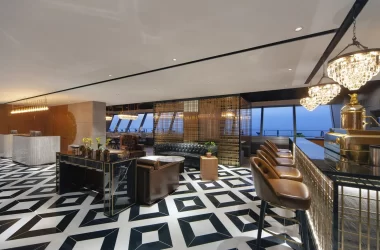In Singapore’s meticulously orchestrated social landscape, the role of a party host has evolved far beyond simple entertainment coordination into a complex mechanism of cultural capital distribution and social stratification that few recognise but everyone participates in. This transformation reveals deeper truths about how power operates in one of the world’s most tightly controlled societies, where even celebration has become subject to the same market forces and social engineering that characterise the city-state’s broader approach to human behaviour.
The Data Behind the Facade
Singapore’s home entertainment market, projected to reach $30.2 million by 2028 with a 7.47% annual growth rate, provides the statistical foundation for understanding how party hosting has become integral to the nation’s social architecture. Yet these figures mask a more profound transformation occurring within Singapore’s 6.03 million residents, 85% of whom maintain an active social media presence.
The numbers tell a revealing story: Singaporeans dedicate 33.2% of their mobile time to entertainment applications, averaging 2 hours and 14 minutes daily on social platforms. This digital immersion creates unprecedented pressure on those who assume the role of event coordinator, as every gathering becomes potential content for social validation and comparison.
The tourism sector’s $22.4 billion contribution in 2024 demonstrates Singapore’s success in monetising experiences, a template that filters down to private celebrations where hosts increasingly operate as unpaid experience curators, absorbing costs and labour whilst guests consume entertainment without full appreciation of the complex logistics involved.
The Psychology of Modern Hosting
Contemporary hosting culture in Singapore reflects broader anxieties about authenticity and social positioning within a hyper-connected society. The rise of “intimate gathering coordinator” and “experience architect” roles represents more than semantic evolution—it signals fundamental changes in how social relationships function under late capitalism.
Research indicates that 23% of consumers now create DIY decorations to reduce costs, whilst simultaneously expecting Instagram-worthy experiences. This contradiction places enormous pressure on domestic entertainers, who must navigate between budget constraints and social expectations that demand visual perfection.
The trend toward smaller, themed gatherings—from Capri-inspired events to “Grandpa Core” aesthetics—reveals how hosting has become a performance of cultural literacy. Those who successfully execute these complex social productions gain social capital, whilst those who cannot risk exclusion from elite networks.
The Labour Economics of Celebration
What remains unexamined in discussions of Singapore’s entertainment boom is the invisible labour performed by residential party organisers. The shift toward “cosy entertaining” and “experiential food experiences” requires extensive preparation, emotional labour, and financial investment that typically falls disproportionately on specific demographics.
Data suggests that home entertainment penetration will reach 61% of households by 2028, yet this statistic obscures who performs the work of entertainment creation. The burden typically falls on individuals—often women—who absorb both financial costs and time investment whilst being expected to appear effortlessly gracious.
Key hosting responsibilities include:
- Financial burden– Average party costs are increasing whilst expectations for quality remain high
- Emotional labour– Managing guest dynamics, dietary restrictions, and social tensions
- Logistical coordination– Venue preparation, equipment sourcing, and cleanup responsibilities
- Performance pressure– Maintaining the appearance of effortless hospitality whilst managing complex operations
Technology and Social Surveillance

Singapore’s technological sophistication creates unique pressures for those hosting social events. With 162.2% mobile connection penetration—more connections than people—every gathering becomes subject to real-time documentation and assessment across multiple platforms.
The rise of “statement cocktails” and “signature dining experiences” responds to social media’s demand for shareable content, yet places additional pressure on home-based event managers to deliver professional-quality experiences using domestic resources. This technological mediation transforms private spaces into performance venues where hosts must simultaneously manage in-person dynamics and digital presentation.
Virtual reality entertainment and AI-driven personalisation, increasingly expected at premium events, demonstrate how technological advancement creates new categories of social obligation for those assuming hosting responsibilities.
Cultural Capital and Class Dynamics
The evolution of hosting expectations in Singapore reflects broader patterns of class distinction and cultural capital accumulation. The ability to execute “multi-sensory experiences” or coordinate “immersive themed environments” requires significant cultural knowledge, financial resources, and social connections.
Those who successfully navigate these complex requirements gain access to Singapore’s social elite, whilst those who cannot risk social marginalisation. This creates a system where social hosting becomes both an opportunity for advancement and a potential source of exclusion, depending on execution quality and resource availability.
The trend toward “sustainable entertainment” adds another layer of complexity, requiring hosts to demonstrate environmental consciousness whilst maintaining luxury standards—a combination that typically requires both cultural sophistication and financial means.
The Political Economy of Social Connection
Singapore’s government actively promotes “family-friendly” entertainment and social cohesion through initiatives like the National Family Festival, recognising the celebration’s role in maintaining social stability. However, this official endorsement of private entertaining creates additional pressure on individual hosts to serve broader social objectives beyond personal enjoyment.
The state’s investment in entertainment infrastructure—from world-class concerts to cultural events—establishes expectations for experience quality that filter down to private celebrations. Citizens who host gatherings operate within this context of elevated standards and implicit competition with professional entertainment options.
Future Implications: Democracy and Celebration
As Singapore’s hosting culture becomes increasingly sophisticated and demanding, questions arise about accessibility and social inclusion. The transformation of simple gatherings into complex productions requiring significant cultural capital and financial resources creates barriers to social participation that may undermine the community bonds that celebration traditionally fostered.
The professionalisation of private entertainment, combined with social media’s amplification of comparison culture, risks creating a two-tier system where social participation depends on hosting capabilities rather than simple human connection.
Singapore’s success in monetising experience and celebration provides a template that other societies may follow, yet the social costs of this transformation remain largely unexamined. As the role of party host becomes increasingly complex and demanding, society must consider whether the pursuit of perfect entertainment enhances or undermines the authentic human connections that celebration originally served.







